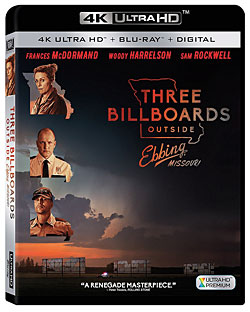

So here’s to the traumatic burn victim who goes to light a cigarette only to wince from the open flame. All one can do is find gallows humor in the darkest situations. In that sense, Mildred’s state of grief is a more potent existential nightmare than the cobbled streets of Bruges, because from the former there really is no escape. Though “Three Billboards Outside of Ebbing, Missouri” pursues a number of narrative strains, it’s really about lost characters doing whatever they can to scheme their way out of a rut. They’re too boring, standing out as throwaway provocations in a film that has real soul. There are several racial epithets and tin-eared midget jokes, and they’re pretty unnecessary. And all of them would hate fags.” While certainly funny, it also represents a script that occasionally leans a little too hard on cheap outrage. Some lines come out spikier than necessary, like Harrelson’s explanation that, “if you got rid of all the cops with vaguely racist leanings, you’d have only have three cops left. That’s really McDonagh’s game plan here, only in lieu of public-radio drawl he stages inspired comic set pieces and ratatat volleys of insults. In more ways than one, the film resembles this year’s blockbuster podcast “S-Town,” which also used the premise of an unsolved murder to wallow in a unique southern community and delight in its cast of eccentrics. Though Mildred embarks on a public campaign against the town authorities, at night everyone meets at the same bar to knock back beers and put public feuds on pause. Nor is it a woman-against-the-world drama. Despite the central absence of the murdered daughter, the film is never a potboiler-whodunit so much as one that plays with expectations and assumptions of the genre and subverts them to devious effect. What starts as kind of showdown between Mildred and the cops soon morphs into something else entirely - there’s really no guessing where this narrative will go. Like McDormand, Rockwell shines here, taking a meaty part and broadening it into a four-course meal.

Initially framed as just another trigger-happy redneck enforcer, Dixon grows in nuance and self-awareness as the tale goes on, treading an unpredictable path that fits the film’s zigzag narrative.

Most of the townsfolk take his side against Mildred, though none more vociferously than his loose-cannon deputy Dixon (Sam Rockwell).

Woody Harrelson brings a hangdog soulfulness to the role of Willoughby, Mildred’s police-chief foil who’s far more preoccupied with his failing health than with the accusatory billboard bearing his name. It would hardly be fair to call this one of her finest performances because, frankly, when is she ever not great? So just say that the role of Mildred - in her volatile, vulnerable and vulgar glory - offers McDormand an impressive showcase for her talents and the actress makes the absolute most of it.įor that matter, so does the rest of the cast. McDormand is an absolute force of nature as the grieving mom whose protests set off a twisting war of attrition with the local fuzz. “RAPED WHILE DYING” reads one, followed by “BUT STILL NO ARRESTS.” Finally the coup de grace, the one that really sets the gears in motion, “HOW COME, CHIEF WILLOUGHBY?” She decides to call them out, renting those titular billboards on the little-used stretch of road where her daughter was found dead. Eight months after the murder of Mildred Hayes’ ( Frances McDormand) daughter, the lazy police still have nothing to show meanwhile, Mildred’s grief (and own feelings of guilt) has curdled into rage. He’s no Saturday Evening Post sentimentalist, but damn if McDonagh hasn’t made a curmudgeonly optimistic portrait of small-town life. But for all the grim narrative tidings and sharp turns where acutely funny bouts of violence become acutely frightening, “Three Billboards Outside of Ebbing, Missouri” is the story of jagged, messy people learning to co-exist, and maybe even grow. Of course, that’s compassion on McDonagh’s terms - the salty writer-director didn’t exactly become Norman Rockwell overnight. Which is to say that not only is “Three Billboards Outside of Ebbing, Missouri” the director’s most accomplished film yet, it’s also his most compassionate. But here McDonagh has crafted the ultimate bait and switch, a film that carries its weary nihilism with a surprisingly light touch, an affectation later dropped in favor of an unexpected message of grace. “Three Billboards Outside of Ebbing, Missouri” certainly feels in line with Martin McDonagh’s previous films, lathering on all the delightful profanity, corrosive one-liners, and acrid curveballs that spiked “In Bruges” and “Seven Psychopaths” with rakish charm.


 0 kommentar(er)
0 kommentar(er)
